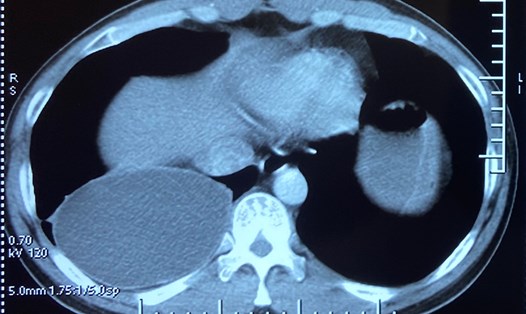For nearly a year now, Mr. A.T. (30 years old, from Phu Tho) has often had a stomachache while going out, accompanied by constipation and little stool collection. Because he thought it was just a normal digestive disorder, he subjectively did not go to the doctor. Recently, when he discovered white, coarse parasites in his stool like gray rice, he went to the Central Hospital for Tropical Diseases for examination.
At the Center for Required Medical Examination and Treatment and International, after being tested for parasites, Mr. T was prescribed to be discharged from the Incestuous Disease to prepare for a colon endoscopy. After the detoxification, the doctors recorded a rope worm over 3 meters long that was discharged from the stool, still alive, and parasitizing in the intestines and colon.
Exploiting the history, the patient said that he had a habit of eating raw vegetables and had not been vaccinated against worms for a long time. He suspected that he had an attack to thania due to eating unsanitary raw vegetables, which may contain thania eggs.
Dr. Le Nguyen Minh Hoa - Chief Technician of the Department of Bi Bi Biology and Mobile Biology - said: After receiving the samples, through initial observations, the professional group suspected that this was cow's line (Taenia saginata), however, it was necessary to diagnose a distinction with pork line (Taenia solium). To accurately identify the type of plant, it is necessary to collect the plant head - the part with identification characteristics. Therefore, the patient will have to take a medicine to expel the entire million fruit, including the head, to avoid recurrence.
Doctor Nguyen Thi Thu Huyen - Center for Required Examination and Treatment and International - added: After having the identification results, the patient will be prescribed specific treatment. Depending on the type of impetigo and the severity of the infection, the doctor may prescribe an exfoliating supplement combined with herbal medicine to push the entire impetigo out. After treatment, the patient needs to be monitored by periodic tests for several weeks to several months to ensure that the roe has been completely removed, there are no eggs or the remaining roe is burned in the intestines.
According to Dr. Huyen, kudzu is a parasite that can live silently for many years in the body without showing obvious symptoms. Some patients only have symptoms of temporary abdominal pain, bloating, digestive disorders, nausea, and weight loss despite eating normally. In many cases, the first sign is the discovery of burning the cow dung out of the stool.
Regarding the mechanism of infection, rhinitis enters the human body through the digestive tract, through eating Larvae or rhinitis eggs in contaminated food. For beef spinach, the main source of infection is rare or undercooked beef. More dangerously, streptococcus not only spreads through meat contaminated with larvae but can also be transmitted from person to person through the feces - hands - mouth if poor hygiene. When entering the body, the eggs bloom into Larvae, penetrate the intestinal wall and can travel to the brain, eyes, muscles... causing dangerous complications, even threatening life.
Doctor Huyen warns: Eggs and larvae can be spread through contaminated food, water or soil. unsafe eating habits such as eating raw meat, stewed blood, raw vegetables without washing them thoroughly, drinking fish sauce or not removing worms regularly all increase the risk of parasitic infections. Each grated grass can contain thousands of eggs. If not treated completely, the eggs will continue to spread, increasing the risk of reinfection for the patient and the community.
To prevent the disease, Dr. Huyen emphasized each person needs to maintain personal hygiene, wash their hands with soap before and after eating, eat cooked food and drink boiled water, limit eating raw meat or raw vegetables that have not been carefully treated. At the same time, you should exfoliate every 6 months, especially for children, the elderly and people with weak immune systems.









